ベーコン イギリス経験論の父 「知識の力」「イドラ」とは 遺産とその影響力

Francis Bacon: The Father of British Empiricism, His Legacy and Influence of “The Power of Knowledge” and “Idols”.
イントロダクション
フランシス・ベーコン、イギリス経験論の父として知られる彼は、17世紀初頭に科学と哲学の革新をもたらしました。彼の名言「知識は力なり」は、現代に至るまで多くの人々に影響を与え続けています。ベーコンは、知識の体系的な探求を通じて人類の進歩を促進することを目指し、そのための方法論を確立しました。
彼の著作『ノヴム・オルガヌム』では、「イドラ(偶像)」という概念を提唱し、人間の認識を妨げる偏見や誤解を4つのカテゴリーに分類しました。これにより、科学的探求の道標を示し、後の科学革命に大きな影響を与えました。
本記事では、ベーコンの思想とその具体的な内容に迫り、彼の遺産がどのように現代の知識社会に影響を及ぼしているのかを探ります。彼の功績とその影響力を深く理解することで、私たちの知識探求の道筋を再確認することができるでしょう。
Introduction
Francis Bacon, renowned as the father of British empiricism, ushered in a revolution in science and philosophy at the beginning of the 17th century. His famous aphorism, “Knowledge is power,” continues to resonate with many to this day. Bacon aimed to promote human progress through the systematic pursuit of knowledge, and he established methodologies for this purpose.
In his work “Novum Organum,” he introduced the concept of “Idols,” categorizing biases and misconceptions that hinder human understanding into four categories. This provided signposts for scientific inquiry and greatly influenced the subsequent scientific revolution.
This article delves into Bacon’s philosophy and its specific content, exploring how his legacy continues to impact contemporary knowledge societies. By deeply understanding his achievements and influence, we can reaffirm the trajectory of our pursuit of knowledge.
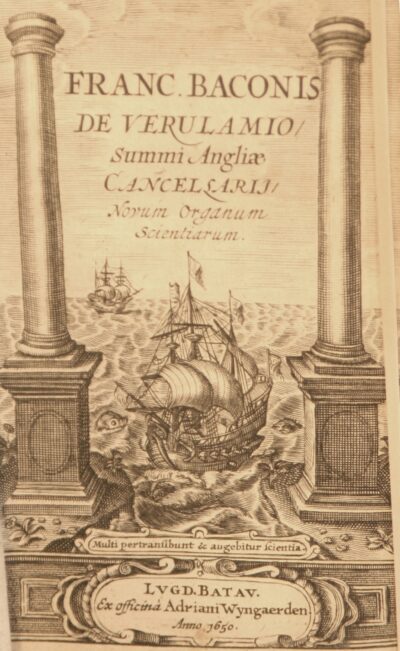
『ノヴム・オルガヌム』の表紙
Title Page of “Novum Organum,” with the Principal Parts Written in 1620
フランシス・ベーコンの生涯と業績
フランシス・ベーコン(1561-1626)は、イギリスのルネサンス哲学者であり、特に「経験論」の発展に寄与した。彼の生涯は、エリザベス1世とジェームズ1世の治世にまたがり、政治家としても活躍し、1618年には大法官に任命される。ベーコンは、「自然哲学」においても重要な役割を果たし、科学的方法の基礎を築いた。
彼の代表的な著作『ノヴム・オルガヌム』は、形而上学や論理学に革新をもたらし、従来のアリストテレス哲学を批判した。数学や神学にも関心を持ち、宗教哲学においても独自の視点を展開した。ベーコンの思想は、後の科学革命に大きな影響を与え、近代科学の父とも称される。
彼の業績は、単なる哲学にとどまらず、実験と観察を重視する「経験論的アプローチ」を確立し、自然の法則を理解するための新たな道を開いた。フランシス・ベーコンの影響は、現代の科学と哲学においても色あせることなく、彼の思想は今なお多くの分野で引用され続けている。
The Life and Achievements of Francis Bacon
Francis Bacon (1561-1626) was a Renaissance philosopher from England who made significant contributions to the development of empiricism. His life spanned the reigns of Queen Elizabeth I and King James I, during which he also excelled as a politician, eventually being appointed as Lord Chancellor in 1618. Bacon played a crucial role in natural philosophy, laying the groundwork for the scientific method.
His seminal work, “Novum Organum,” brought innovation to metaphysics and logic, critiquing traditional Aristotelian philosophy. He had interests in mathematics and theology as well, developing his own perspectives in religious philosophy. Bacon’s ideas greatly influenced the subsequent scientific revolution, earning him the title of the father of modern science.
His achievements extended beyond mere philosophy; he established an empirical approach that prioritized experimentation and observation, paving the way for a new understanding of the laws of nature. Francis Bacon’s influence remains undiminished in modern science and philosophy, with his ideas continuing to be cited across various fields to this day.

Elizabeth I
イングランド女王
Queen Elizabeth I of England
幼少期と教育
フランシス・ベーコンは「ルネサンス哲学」の重要な人物であり、その幼少期と教育が彼の思想形成に大きな影響を与えました。1561年にロンドンで生まれたベーコンは、幼少期から「自然哲学」や「数学」、そして「論理学」に興味を持っていました。彼の父親はエリザベス1世の側近であり、その影響でベーコンは幼少期から高い教育を受ける機会に恵まれました。特に「イギリス経験論」の基盤を築く上で、彼の教育は極めて重要でした。
ベーコンは12歳でケンブリッジ大学に入学し、そこで「形而上学」や「神学」、そして「宗教哲学」にも触れました。しかし、彼は伝統的なアリストテレス哲学に疑問を抱き、新しい知識の探求を目指しました。これは後に彼の著作『ノヴム・オルガヌム』に結実し、科学的方法の基盤となりました。
ベーコンの教育は、彼の思想と著作に多大な影響を与え、「ルネサンス哲学」の発展に寄与しました。彼の幼少期の経験と教育は、現代の「自然哲学」や「論理学」にも大きな影響を与え続けています。
Childhood and Education
Francis Bacon, a prominent figure in Renaissance philosophy, was greatly influenced in his philosophical development by his childhood and education. Born in London in 1561, Bacon showed an early interest in natural philosophy, mathematics, and logic. His father was a close associate of Queen Elizabeth I, which afforded Bacon ample opportunities for a high-quality education from an early age. His education was particularly crucial in laying the groundwork for British empiricism.
Entering Cambridge University at the age of 12, Bacon encountered metaphysics, theology, and religious philosophy. However, he harbored doubts about traditional Aristotelian philosophy and sought to pursue new avenues of knowledge. This pursuit culminated in his work “Novum Organum,” which laid the foundation for the scientific method.
Bacon’s education had a profound impact on his philosophy and writings, contributing to the development of Renaissance philosophy. His childhood experiences and education continue to exert significant influence on modern natural philosophy and logic.
政界でのキャリアと初の挫折
フランシス・ベーコンは、ルネサンス哲学において重要な「イギリス経験論」の礎を築いた人物です。彼の政界でのキャリアは、エリザベス1世とジェームズ1世の治世において大きな影響力を持ちました。特に1618年に大法官に任命されたことは、彼の政治的成功の頂点でした。しかし、1621年に収賄の罪で告発され、失脚します。この挫折は、彼の自然哲学や形而上学の研究に専念する契機となりました。ベーコンは、数学や論理学においても革新的な視点を提供し、後の科学革命に大きな影響を与えました。また、神学や宗教哲学にも興味を持ち、知識の体系化を試みました。彼の著作『ノヴム・オルガヌム』は、科学的方法論の基礎を築く重要な作品として知られています。
Political Career and First Setback
Francis Bacon, a pivotal figure in Renaissance philosophy, laid the groundwork for the influential British empiricism. His career in politics wielded significant influence during the reigns of Queen Elizabeth I and King James I. Particularly, his appointment as Lord Chancellor in 1618 marked the pinnacle of his political success. However, in 1621, he faced accusations of bribery and fell from grace. This setback became an opportunity for him to dedicate himself to the study of natural philosophy and metaphysics. Bacon provided innovative perspectives in mathematics and logic, profoundly impacting the later scientific revolution. Additionally, he explored theology and religious philosophy, endeavoring to systematize knowledge. His work “Novum Organum” is renowned as a seminal work laying the foundation for the scientific method.
エセックス伯の保護とその終焉
エセックス伯ロバート・デヴァルーは、フランシス・ベーコンの庇護者として知られています。エリザベス朝時代の「ルネサンス哲学」に大きな影響を与えた彼は、イギリス経験論の発展にも寄与しました。1588年にエリザベス1世の寵臣として登場し、政治的な影響力を持ちましたが、1601年に反乱を起こし失敗。その結果、処刑されました。
ベーコンはエセックス伯の庇護を受けて「自然哲学」や「形而上学」の研究を進め、数学や論理学の分野でも成果を上げました。特に「神学」と「宗教哲学」においても彼の影響は無視できません。エセックス伯の失脚はベーコンにとっても大きな打撃となり、その後の彼のキャリアに影響を与えました。
エセックス伯の終焉は、エリザベス朝の政治と哲学の歴史において重要な転換点となりました。彼の庇護がなければ、ベーコンの思想もまた異なる形を取っていたかもしれません。
The Patronage and Downfall of the Earl of Essex
Robert Devereux, the Earl of Essex, is known as a patron of Francis Bacon. Influential in the Renaissance philosophy of the Elizabethan era, he also contributed to the development of British empiricism. Rising to prominence as a favorite of Queen Elizabeth I in 1588, he wielded political influence but faced a failed rebellion in 1601, resulting in his execution.
Under the patronage of the Earl of Essex, Bacon advanced his studies in natural philosophy and metaphysics, achieving notable progress in mathematics and logic. His influence in theology and religious philosophy cannot be overlooked either. The downfall of the Earl of Essex dealt a significant blow to Bacon, influencing his subsequent career trajectory.
The demise of the Earl of Essex marked a pivotal moment in the history of Elizabethan politics and philosophy. Without his patronage, Bacon’s ideas might have taken a different form.
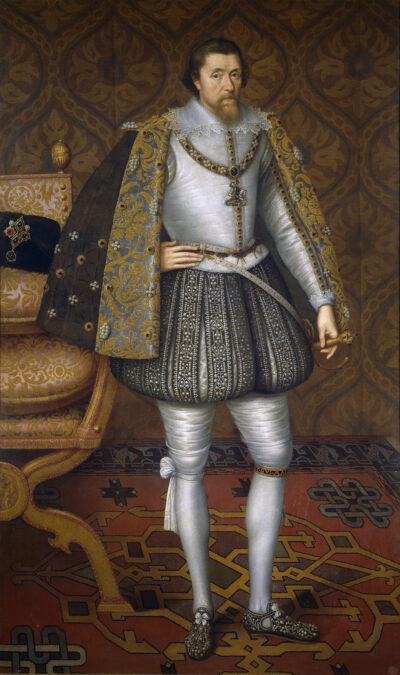
James I / James VI
イングランド国王
スコットランド国王
James I / James VI
King of England
King of Scotland
ジェームズ1世の宮廷での昇進
ジェームズ1世の宮廷での昇進は、当時の「フランシス・ベーコン」にとって重要な節目となった。1603年に即位したジェームズ1世の支持を得たベーコンは、1607年にはソリシター・ジェネラルに任命された。その後も次々と昇進を重ね、1618年にはついに大法官の地位に就くこととなる。彼の昇進は、イギリスの「ルネサンス哲学」と「自然哲学」の発展に大きく寄与した。
特に「イギリス経験論」の基礎を築いたベーコンの影響は大きく、彼の「形而上学」や「数学」、「論理学」に対する洞察は後の哲学者たちに多大な影響を与えた。彼の著作『ノヴム・オルガヌム』は、科学的探求の方法論を確立し、実験と観察を重視する現代科学の礎を築いた。
また、ベーコンの「神学」や「宗教哲学」における考察も無視できない。彼は宗教と科学の調和を追求し、知識の統一を目指した。ジェームズ1世の宮廷での昇進は、ベーコンの思想が広く認められ、その影響力が増大する契機となった。
Advancements at the Court of James I
The rise within the court of James I marked a significant milestone for Francis Bacon at the time. Gaining favor with James I upon his ascension to the throne in 1603, Bacon was appointed Solicitor General in 1607. He continued to ascend through the ranks, eventually attaining the position of Lord Chancellor in 1618. His advancements greatly contributed to the development of Renaissance and natural philosophy in England.
Particularly noteworthy was Bacon’s influence in laying the foundation of British empiricism. His insights into metaphysics, mathematics, and logic profoundly influenced later philosophers. His work “Novum Organum” established the methodology for scientific inquiry, laying the groundwork for modern science that prioritizes experimentation and observation.
Moreover, Bacon’s contemplations in theology and religious philosophy are noteworthy. He sought harmony between religion and science, aiming for a unified body of knowledge. His advancements at the court of James I led to wider recognition of his ideas and increased his influence significantly.
裁判所、議会、国王との交渉
フランシス・ベーコンはルネサンス哲学の重要な人物であり、「イギリス経験論」の先駆者として知られる。彼は裁判所や議会での交渉に長けており、特にエリザベス1世やジェームズ1世との関係が深かった。ベーコンは自然哲学の発展にも寄与し、『新機関(Novum Organum)』を著し、科学的方法の基礎を築いた。形而上学や数学、論理学にも関心を持ち、それらを統合する視点から独自の哲学体系を構築した。彼の哲学は神学や宗教哲学とも密接に関連し、宗教と科学の調和を目指した。議会では法律改革を推進し、裁判所では公正な裁判を重視する姿勢を示した。ベーコンの思想は後の科学革命にも大きな影響を与え、現代の科学的探求の礎となっている。彼の交渉術と哲学的視点は、当時の政治や学問に多大な影響を及ぼした。
Negotiations with Courts, Parliament, and the Monarch
Francis Bacon stands as a significant figure in Renaissance philosophy, revered as a pioneer of British empiricism. He possessed a knack for negotiations in both the courts and parliament, particularly cultivating deep relationships with Queen Elizabeth I and James I. Bacon contributed to the advancement of natural philosophy, publishing “Novum Organum” and laying the foundation for the scientific method. With interests spanning metaphysics, mathematics, and logic, he crafted his own philosophical system from an integrative perspective. His philosophy closely intertwined with theology and religious philosophy, aiming for harmony between religion and science. In parliament, he advocated for legal reforms, while in the courts, he prioritized fairness in adjudication. Bacon’s ideas wielded significant influence on the subsequent scientific revolution, forming the bedrock of modern scientific inquiry. His negotiation skills and philosophical insights left a profound impact on the politics and academia of his time.
議会からの告発とキャリアの終焉
フランシス・ベーコンは、ルネサンス期の「哲学者」であり、特に「イギリス経験論」の礎を築いた人物として知られています。彼の「自然哲学」や「形而上学」における革新は、科学的手法の発展に大きく寄与しました。しかし、彼の「キャリア」は議会からの告発によって大きな打撃を受けました。1621年、ベーコンは「収賄」容疑で告発され、裁判にかけられることとなります。この告発は、彼の「論理学」や「数学」における業績をも覆い隠すほどの衝撃を与えました。彼は最終的に有罪判決を受け、「公職」を追われることとなります。ベーコンはその後も「神学」や「宗教哲学」に関する著作を続けましたが、以前のような影響力を取り戻すことはできませんでした。
Accusations from Parliament and the End of a Career
Francis Bacon, a philosopher of the Renaissance era, is renowned for laying the groundwork for British empiricism, particularly in natural philosophy and metaphysics, which significantly contributed to the development of scientific methodology. However, his career suffered a significant blow with accusations from Parliament. In 1621, Bacon was accused of bribery and faced trial. This accusation overshadowed his achievements in logic and mathematics to such an extent that he was ultimately found guilty and stripped of public office. Though he continued to write on theology and religious philosophy afterward, he never regained his former influence.
フランシス・ベーコンの影響と遺産
フランシス・ベーコン(1561-1626)は、「ルネサンス哲学」の重要な人物であり、特に「イギリス経験論」の基礎を築いたことで知られています。彼の「自然哲学」は、科学的方法の確立に大きな影響を与えました。ベーコンは、観察と実験を重視し、理論よりも実証的なデータを重んじる姿勢を持っていました。彼の著作『ノヴム・オルガヌム』(1620)は、科学的探求の新しい方法を提案し、後の「形而上学」や「数学」にも影響を与えました。また、彼は「論理学」にも貢献し、科学的方法の論理的基盤を築きました。ベーコンの思想は、「神学」や「宗教哲学」にも波及し、信仰と理性の調和を追求しました。彼の遺産は、現代の科学と哲学においても重要な位置を占めています。
The Influence and Legacy of Francis Bacon
Francis Bacon (1561-1626) is recognized as a significant figure in Renaissance philosophy, particularly for laying the groundwork for British empiricism. His natural philosophy had a profound impact on the establishment of scientific methodology. Bacon emphasized observation and experimentation, prioritizing empirical data over theory. His work “Novum Organum” (1620) proposed new methods for scientific inquiry, influencing later metaphysics and mathematics. Additionally, he contributed to logic, laying the logical foundation of the scientific method. Bacon’s ideas also extended to theology and religious philosophy, seeking harmony between faith and reason. His legacy remains prominent in contemporary science and philosophy.

René Descartes
フランシス・ベーコンの人物像
フランシス・ベーコンは、1561年にロンドンで生まれました。彼は「ルネサンス哲学」を代表する思想家であり、「イギリス経験論」の祖としても知られています。彼の思想は、科学的方法の確立に大きな影響を与え、特に「自然哲学」において重要な役割を果たしました。ベーコンは形而上学や数学にも深い関心を持ち、論理学の基礎を築きました。
彼の著作『ノヴム・オルガヌム』は、科学的探究の方法論を提唱し、従来のアリストテレス的な思考を批判しました。また、ベーコンは「神学」や「宗教哲学」にも関心を寄せ、宗教と科学の調和を目指しました。彼の影響は、後のデカルトやニュートンなど多くの哲学者や科学者に及びました。
フランシス・ベーコンの思想は、現代においてもなお重要な位置を占めています。彼の探究心と革新的な思考は、今もなお多くの人々にインスピレーションを与え続けています。
The Persona of Francis Bacon
Francis Bacon was born in 1561 in London. He is celebrated as a philosopher representing Renaissance philosophy and is revered as the founder of British empiricism. His ideas wielded significant influence in establishing the scientific method, particularly in the realm of natural philosophy. Bacon also harbored deep interests in metaphysics and mathematics, laying the groundwork for logic.
His work “Novum Organum” advocated for a methodology of scientific inquiry, criticizing conventional Aristotelian thought. Furthermore, Bacon showed an interest in theology and religious philosophy, aspiring for harmony between religion and science. His influence extended to many philosophers and scientists, including later figures like Descartes and Newton.
The philosophy of Francis Bacon continues to hold a crucial position in modern discourse. His spirit of inquiry and innovative thinking still inspire countless individuals today.

Sir Isaac Newton
政治と哲学に対する視点
ルネサンス期には「フランシス・ベーコン」が自然哲学とイギリス経験論の基礎を築いた。彼は科学的探求の重要性を強調し、経験と観察を通じて知識を得る方法を提唱した。ベーコンの影響は、後の「形而上学」や論理学にも及び、科学革命を促進した。
一方、政治哲学ではトマス・ホッブズが『リヴァイアサン』で国家の権力と市民の関係を論じた。彼の思想は、社会契約論の先駆けとして評価されている。ホッブズの視点は、現代の政治理論にも多大な影響を与えている。
また、ルネサンス期の哲学は「神学」と「宗教哲学」にも深く関与しており、宗教改革と共に新たな思想が生まれた。マルティン・ルターの宗教改革は、信仰と理性の関係を再定義し、ヨーロッパ全体に大きな波紋を広げた。
ルネサンス哲学は、数学や論理学の発展にも寄与し、デカルトの『方法序説』などがその好例である。彼の方法論は、現代科学の基礎となり、合理的思考の重要性を示した。
Perspectives on Politics and Philosophy
During the Renaissance, Francis Bacon laid the groundwork for natural philosophy and British empiricism. He underscored the significance of scientific inquiry and advocated for acquiring knowledge through experience and observation. Bacon’s influence extended to later metaphysics and logic, catalyzing the scientific revolution.
In the realm of political philosophy, Thomas Hobbes tackled the relationship between state power and citizens in “Leviathan.” His ideas are revered as pioneering social contract theory. Hobbes’s perspective continues to wield substantial influence on modern political thought.
Moreover, Renaissance philosophy was deeply intertwined with theology and religious philosophy, giving birth to fresh ideologies alongside the religious reformation. Martin Luther’s religious reformulation redefined the interplay between faith and reason, sending significant reverberations throughout Europe.
Renaissance philosophy also made significant contributions to the advancement of mathematics and logic, with Descartes’ “Discourse on the Method” serving as a prime example. His methodology laid the groundwork for modern science and emphasized the importance of rational thought.
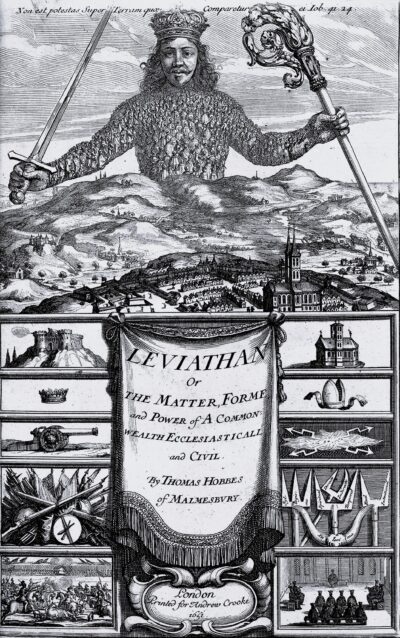
The cover of “Leviathan” by Abraham Bosse. The towering figure depicted at the top is composed of numerous human figures.
法の理念とその改革
法の理念は、時代とともに進化してきました。フランシス・ベーコンはルネサンス期に「経験論」を提唱し、法の理解に新たな視点をもたらしました。彼の自然哲学は、観察と実験を重視し、法の適用にも科学的アプローチを導入しました。イギリス経験論の影響を受けたベーコンの思想は、後に形而上学や論理学にも影響を与えました。
ルネサンス哲学では、数学や論理学の進展が法の理念に大きな影響を与えました。特に、神学や宗教哲学との関係性も深まり、法の倫理的基盤が再評価されました。17世紀には、法の改革が進み、ベーコンの影響を受けた法学者たちが新しい理論を構築しました。法の理念とその改革は、歴史的文脈の中で多様な要素が交錯し、現代の法体系に至るまでの重要な過程を経てきたのです。
The Concept of Law and its Reform
The concept of law has evolved over time. Francis Bacon advocated for empiricism during the Renaissance, bringing new perspectives to the understanding of law. His natural philosophy emphasized observation and experimentation, introducing a scientific approach to the application of law. Bacon’s thought, influenced by British empiricism, later impacted metaphysics and logic as well.
In Renaissance philosophy, advancements in mathematics and logic greatly influenced the concept of law. Particularly, the deepening relationship with theology and religious philosophy led to a reassessment of the ethical foundation of law. In the 17th century, legal reform progressed, with scholars influenced by Bacon constructing new theories. The concept of law and its reform have been shaped by diverse elements throughout history, culminating in the significant processes leading to modern legal systems.
『エッセイ』から読み解くイギリス経験論
フランシス・ベーコンは、ルネサンス哲学の重要な人物として知られ、彼の『エッセイ』はイギリス経験論の基礎を築いた。経験論とは、知識が「経験」から生まれるとする哲学的立場であり、ベーコンはこの考えを自然哲学や形而上学に応用した。彼の著作は、論理学や数学の発展にも影響を与えた。
ベーコンは、科学的方法の確立に貢献し、観察と実験を重視する姿勢を強調した。彼のアプローチは、後の科学者たちに多大な影響を与え、経験に基づく知識の重要性を説いた。さらに、神学や宗教哲学にも影響を及ぼし、知識の体系化を目指した。
ベーコンの思想は、17世紀のイギリス哲学に大きな影響を与え、ジョン・ロックやデイヴィッド・ヒュームといった後続の哲学者たちにも引き継がれた。彼の『エッセイ』は、知識の源泉を探求するための重要なテキストであり、現代においてもその価値は色あせない。
Interpreting British Empiricism through “Essays”
Francis Bacon, renowned as a significant figure in Renaissance philosophy, laid the foundation for British empiricism in his “Essays.” Empiricism posits that knowledge arises from “experience,” a philosophical stance Bacon applied to natural philosophy and metaphysics. His works also influenced the development of logic and mathematics.
Bacon contributed to the establishment of scientific methodology, emphasizing the importance of observation and experimentation. His approach profoundly influenced later scientists, advocating for the significance of knowledge grounded in experience. Furthermore, his ideas extended to theology and religious philosophy, aiming for the systematization of knowledge.
Bacon’s philosophy had a profound impact on 17th-century British philosophy and was inherited by subsequent philosophers such as John Locke and David Hume. His “Essays” remain an invaluable text for exploring the sources of knowledge, retaining their relevance in modern times.
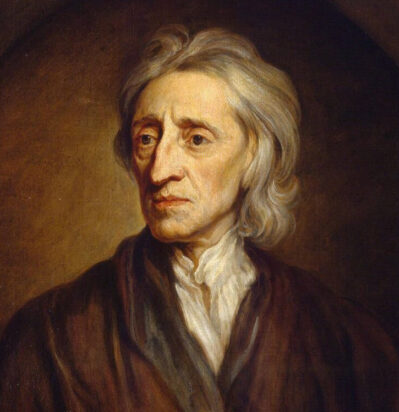
John Locke
法の理念とその改革
法の理念は、時代とともに進化してきました。フランシス・ベーコンはルネサンス期に「経験論」を提唱し、法の理解に新たな視点をもたらしました。彼の自然哲学は、観察と実験を重視し、法の適用にも科学的アプローチを導入しました。イギリス経験論の影響を受けたベーコンの思想は、後に形而上学や論理学にも影響を与えました。
ルネサンス哲学では、数学や論理学の進展が法の理念に大きな影響を与えました。特に、神学や宗教哲学との関係性も深まり、法の倫理的基盤が再評価されました。17世紀には、法の改革が進み、ベーコンの影響を受けた法学者たちが新しい理論を構築しました。法の理念とその改革は、歴史的文脈の中で多様な要素が交錯し、現代の法体系に至るまでの重要な過程を経てきたのです。
The Concept of Law and Its Reform
The concept of law has evolved over time. Francis Bacon advocated for empiricism during the Renaissance, bringing new perspectives to the understanding of law. His natural philosophy emphasized observation and experimentation, introducing a scientific approach to the application of law. Bacon’s thought, influenced by British empiricism, later impacted metaphysics and logic as well.
In Renaissance philosophy, advancements in mathematics and logic greatly influenced the concept of law. Particularly, the deepening relationship with theology and religious philosophy led to a reassessment of the ethical foundation of law. In the 17th century, legal reform progressed, with scholars influenced by Bacon constructing new theories. The concept of law and its reform have been shaped by diverse elements throughout history, culminating in the significant processes leading to modern legal systems.
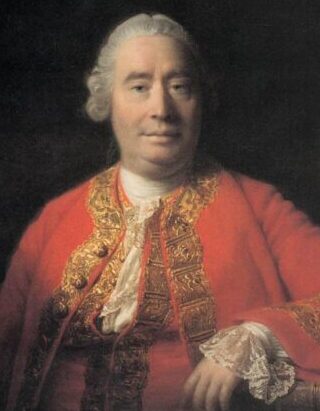
David Hume
フランシス・ベーコンの栄誉と称号
フランシス・ベーコンは「ルネサンス哲学」の重要な人物であり、特に「イギリス経験論」の先駆者として知られています。彼の功績は「自然哲学」や「形而上学」にも及び、科学的方法の確立に大きな影響を与えました。1561年に生まれたベーコンは、若くして「数学」や「論理学」に興味を持ち、その後「神学」や「宗教哲学」にも深い関心を示しました。
彼の著作『ノヴム・オルガヌム』は、科学的探求の基盤を築き、多くの学者に影響を与えました。また、ベーコンは「枢密院」のメンバーとしても活躍し、政治家としても高い評価を受けています。彼の哲学は、観察と実験を重視し、経験に基づく知識の重要性を強調しました。
1626年に亡くなったベーコンですが、その思想は「啓蒙時代」にも大きな影響を与え、現代の科学や哲学の基盤を築く一助となりました。彼の栄誉と称号は、後世にわたって高く評価され続けています。
Honors and Titles of Francis Bacon
Francis Bacon is a significant figure in Renaissance philosophy, particularly known as a pioneer of British empiricism. His achievements extend to natural philosophy and metaphysics, greatly influencing the establishment of scientific methodology. Born in 1561, Bacon showed an early interest in mathematics and logic, later delving into theology and religious philosophy.
His work, “Novum Organum,” laid the groundwork for scientific inquiry and influenced numerous scholars. Additionally, Bacon served as a member of the Privy Council and was highly regarded as a politician. His philosophy emphasized observation and experimentation, highlighting the importance of knowledge based on experience.
Although Bacon passed away in 1626, his ideas continued to have a significant impact during the Enlightenment era, contributing to the foundation of modern science and philosophy. His honors and titles have been consistently esteemed throughout subsequent generations.
爵位とその継承
爵位は、中世ヨーロッパにおいて「社会的地位」を示す重要な要素でした。爵位の継承には「長子相続制」が一般的であり、家督は長男が受け継ぐことが多かったです。イギリスでは「フランシス・ベーコン」が爵位を持っていましたが、彼は「ルネサンス哲学」の重要な人物でもあります。ベーコンは「自然哲学」においてもその名を馳せ、特に「イギリス経験論」の基礎を築きました。
爵位の継承と哲学の発展は密接に関連しており、例えば「形而上学」や「論理学」においても爵位を持つ貴族たちが大きな影響を与えました。数学や神学、そして宗教哲学も「中世の貴族社会」において重要な役割を果たしました。爵位を持つ人物が学問に資金を提供し、その結果として「学問の発展」が促進されました。
Titles of Nobility and Their Succession
Titles of nobility were significant indicators of social status in medieval Europe. Inheritance of titles commonly followed primogeniture, where the eldest son would typically inherit the family estate. In England, Francis Bacon held a title of nobility, alongside being a prominent figure in Renaissance philosophy. Bacon gained renown in natural philosophy, particularly laying the foundation for British empiricism.
The succession of titles of nobility and the development of philosophy were closely intertwined. Noble individuals holding titles exerted significant influence, even in fields like metaphysics and logic. Mathematics, theology, and religious philosophy also played crucial roles in medieval aristocratic society. Those holding titles of nobility often provided funding for academia, thereby fostering the advancement of scholarship.
フランシス・ベーコンの著作
フランシス・ベーコンは、ルネサンス期の「哲学者」として知られており、特に「イギリス経験論」の基礎を築いた人物です。彼の代表的な著作には『ノヴム・オルガヌム』(1620年)があり、この作品で「科学的方法」を提唱しました。ベーコンは「自然哲学」にも多大な影響を与え、観察と実験を重視する姿勢を強調しました。
また、彼の『ニュー・アトランティス』は理想的な社会を描いたユートピア文学として評価されています。ベーコンの思想は「形而上学」や「論理学」にも及び、知識の体系化を目指しました。彼の「数学」への関心も高く、科学的探究の基盤として位置づけられています。
ベーコンは「神学」にも深い関心を持ち、宗教と科学の調和を模索しました。彼の著作は「宗教哲学」にも影響を与え、信仰と理性の関係を探求しました。フランシス・ベーコンの思想は、後の哲学者や科学者に多大な影響を与え続けています。
The Works of Francis Bacon
Francis Bacon is renowned as a philosopher of the Renaissance era, particularly known for laying the groundwork for British empiricism. One of his seminal works is “Novum Organum” (1620), where he advocated for the “scientific method.” Bacon exerted significant influence in natural philosophy as well, emphasizing the importance of observation and experimentation.
Furthermore, his work “New Atlantis” is esteemed as utopian literature portraying an ideal society. Bacon’s philosophical ideas extended to metaphysics and logic, aiming for the systematization of knowledge. His keen interest in mathematics also positioned it as a cornerstone of scientific inquiry.
Bacon held deep interest in theology as well, seeking harmony between religion and science. His writings influenced religious philosophy, exploring the relationship between faith and reason. The philosophy of Francis Bacon continues to exert profound influence on later philosophers and scientists.
日本語訳された主要作品
フランシス・ベーコンは「ルネサンス哲学」の巨匠であり、彼の作品は「日本語訳」されて多くの読者に親しまれています。彼の代表作『ノヴム・オルガヌム』は、「イギリス経験論」の基礎を築き、科学的探求の方法論を詳細に論じています。この作品では、観察と実験に基づく「自然哲学」の重要性が強調されています。
ベーコンの思想は「形而上学」にも影響を与え、現実世界の理解を深めるための新しい視点を提供しました。彼のアプローチは「数学」や「論理学」にも応用され、科学的思考の発展に寄与しました。また、ベーコンの著作は「神学」や「宗教哲学」にも関心を持つ読者にとって興味深いものです。
特に『ノヴム・オルガヌム』では、知識の体系化と「宗教哲学」との関係が探求されています。日本語訳されたベーコンの作品は、現代の読者にとってもその価値が失われることなく、深い洞察を提供し続けています。
Japanese Translations of Major Works
Francis Bacon, a master of Renaissance philosophy, has had many of his works translated into Japanese, making them accessible to a wide audience. His seminal work, “Novum Organum,” lays the foundation for British empiricism and meticulously discusses the methodology of scientific inquiry. This work emphasizes the importance of natural philosophy based on observation and experimentation.
Bacon’s philosophy has influenced metaphysics as well, offering new perspectives to deepen understanding of the real world. His approach has been applied to mathematics and logic, contributing to the development of scientific thinking. Additionally, Bacon’s writings are of interest to readers interested in theology and religious philosophy.
In particular, “Novum Organum” explores the systematization of knowledge and its relationship with religious philosophy. Japanese translations of Bacon’s works retain their value for modern readers, providing profound insights without losing their significance.
注釈と出典
フランシス・ベーコンはルネサンス哲学の重要な人物であり、イギリス経験論の基礎を築いた。彼の「自然哲学」は観察と実験を重視し、科学的方法の発展に大きく寄与した。特に『新機関』は、その具体的な方法論を示す重要な著作である。ベーコンは「形而上学」にも関心を持ち、知識の体系化を試みた。彼の思想は、数学や論理学の進展にも影響を与えた。
ベーコンの時代、神学や宗教哲学も重要な学問領域であり、彼の思想はこれらの分野との対話を通じて深化した。彼の「出典」は主に古典文学や聖書であり、これらを通じて新しい知識体系を構築した。ベーコンの注釈は、彼の哲学的立場を明確にするものであり、後世の哲学者たちに大きな影響を与えた。
Annotations and Sources
Francis Bacon is a significant figure in Renaissance philosophy, laying the foundation for British empiricism. His natural philosophy emphasized observation and experimentation, making significant contributions to the development of scientific methodology. Particularly, “Novum Organum” stands as an important work illustrating his specific methodology. Bacon also had an interest in metaphysics and attempted to systematize knowledge. His ideas influenced advancements in mathematics and logic.
During Bacon’s era, theology and religious philosophy were also crucial areas of study, and his philosophy deepened through dialogue with these fields. His sources primarily include classical literature and the Bible, through which he constructed new systems of knowledge. Bacon’s annotations served to clarify his philosophical stance and greatly influenced later philosophers.
注釈
「注釈」は、哲学や「神学」などの学問分野において非常に重要な役割を果たします。特に「フランシス・ベーコン」はルネサンス期の「自然哲学」者として知られ、その著作には多くの注釈が付されています。ベーコンは「イギリス経験論」の創始者とされ、彼の思想は後の科学的探求に大きな影響を与えました。彼の主要な著作『ノヴム・オルガヌム』には、実験と観察の重要性が強調されており、これに対する注釈が多くの学者によって行われています。
「形而上学」や「論理学」などの分野でも注釈は欠かせません。例えば、アリストテレスの『形而上学』には、数多くの注釈が存在し、その解釈は時代とともに変遷してきました。また、「数学」や「宗教哲学」においても、注釈は理解を深めるための重要な手段とされています。特に中世の神学者たちは、聖書やアウグスティヌスの著作に対する注釈を通じて、自らの「神学」体系を構築しました。注釈は、単なる補足情報ではなく、学問の進化に不可欠な要素なのです。
Annotations
Annotations play a crucial role in academic fields such as philosophy and theology. In particular, Francis Bacon, known as a natural philosopher of the Renaissance period, included numerous annotations in his writings. Bacon is regarded as the founder of British empiricism, and his ideas had a significant influence on later scientific inquiry. His major work, “Novum Organum,” emphasizes the importance of experimentation and observation, prompting annotations by numerous scholars.
Annotations are also indispensable in fields like metaphysics and logic. For instance, Aristotle’s “Metaphysics” has numerous annotations, and interpretations of it have evolved over time. Moreover, in disciplines like mathematics and religious philosophy, annotations are considered vital for deepening understanding. Particularly, medieval theologians constructed their theological systems through annotations on the Bible and the works of Augustine. Annotations are not mere supplementary information but essential elements for the evolution of scholarship.

Raphael’s Painting, 1509: Plato and Aristotle
主要な参考文献
フランシス・ベーコンは、ルネサンス哲学の重要な「人物」であり、イギリス経験論の先駆者として知られています。彼の「主著」である『ノヴム・オルガヌム』は、科学的方法の基礎を築き、自然哲学に革命をもたらしました。ベーコンの「思想」は、観察と実験を重視し、形而上学的な「推論」よりも経験に基づく知識の獲得を推進しました。
ルネサンス期の哲学は、古典的な「ギリシャ哲学」と中世の神学を再評価し、論理学や数学に新たな光を当てました。特に、宗教哲学と神学の関係が再検討され、信仰と理性の調和が模索されました。ベーコンの影響は、後の「科学革命」にも及び、現代の科学的探求の「基盤」となっています。
Key References
Francis Bacon stands as a prominent figure in Renaissance philosophy, renowned as a trailblazer of British empiricism. His seminal work, “Novum Organum,” laid the groundwork for the scientific method, revolutionizing natural philosophy. Bacon’s philosophy emphasized the importance of observation and experimentation, advocating for the acquisition of knowledge based on experience rather than metaphysical speculation.
Renaissance philosophy reevaluated classical Greek philosophy and medieval theology, shedding new light on logic and mathematics. Particularly, the relationship between religious philosophy and theology was reassessed, seeking harmony between faith and reason. Bacon’s influence extended to the later Scientific Revolution, becoming the cornerstone of modern scientific inquiry.
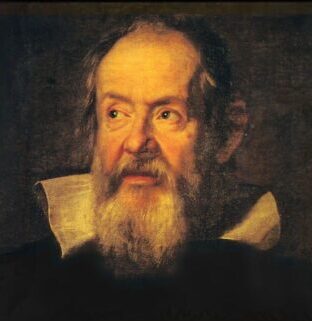
Galileo Galilei
Portrait of 1636 (Painted by Justus Sustermans)
フランシス・ベーコンと関連する主要な人物・概念
フランシス・ベーコンは、16世紀から17世紀にかけて活躍した「ルネサンス哲学」の巨匠であり、「イギリス経験論」の先駆者として知られる。彼の思想は「自然哲学」に深く根ざしており、科学的探求の方法論を革新した。特に「形而上学」に対する批判的な視点は、後の哲学者たちに大きな影響を与えた。
ベーコンと関連する主要な人物としては、ガリレオ・ガリレイが挙げられる。ガリレオと同時代に生きたベーコンは、科学的方法の重要性を強調し、実験と観察を重視した。これにより、従来の「数学」や「論理学」だけでなく、実証的な科学研究の基盤を築いた。
また、ベーコンの「神学」や「宗教哲学」に対する見解も興味深い。彼は信仰と科学の調和を目指し、宗教的信念と科学的探求が共存できると主張した。この思想は、後の時代においても多くの哲学者や科学者に影響を与え続けている。
Key Figures and Concepts Associated with Francis Bacon
Francis Bacon, a master of Renaissance philosophy who flourished from the 16th to the 17th century, is renowned as a pioneer of British empiricism. His philosophy is deeply rooted in natural philosophy and revolutionized the methodology of scientific inquiry. Particularly, his critical perspective on metaphysics had a profound impact on subsequent philosophers.
One of the key figures associated with Bacon is Galileo Galilei. Living contemporaneously with Galileo, Bacon emphasized the importance of scientific methodology and stressed the significance of experimentation and observation. Through this emphasis, he laid the groundwork not only for traditional fields like mathematics and logic but also for empirical scientific research.
Furthermore, Bacon’s views on theology and religious philosophy are intriguing. He aimed for harmony between faith and science, advocating that religious beliefs and scientific inquiry can coexist. This philosophy continues to influence many philosophers and scientists in later periods.
フランシス・ベーコンについて更に知るためのリンク集
フランシス・ベーコンは「ルネサンス哲学」の重要な人物で、特に「イギリス経験論」の基礎を築いたことで知られています。彼の思想は「自然哲学」や「形而上学」にも深く影響を与えました。ベーコンの著作『ノヴム・オルガヌム』は、科学的方法の重要性を説くものであり、現代の「数学」や「論理学」にも大きな影響を与えています。
ベーコンはまた、「神学」や「宗教哲学」にも関心を持ち、科学と宗教の調和を目指しました。彼の時代背景を理解するためには、16世紀後半から17世紀初頭の「イギリス」の歴史的文脈も重要です。ベーコンの思想を深く理解するためには、彼の他の著作や関連する哲学者の研究も参照すると良いでしょう。
Links for Further Exploration on Francis Bacon
Francis Bacon is a significant figure in Renaissance philosophy, particularly known for laying the groundwork for British empiricism. His ideas deeply influenced natural philosophy and metaphysics. Bacon’s work, “Novum Organum,” advocates for the importance of scientific methodology, leaving a profound impact on modern mathematics and logic.
Additionally, Bacon held an interest in theology and religious philosophy, aiming for harmony between science and religion. Understanding the historical context of England from the late 16th to early 17th centuries is crucial to grasp Bacon’s ideas fully. To gain a deeper understanding of Bacon’s philosophy, it would be beneficial to explore his other works and studies of related philosophers.
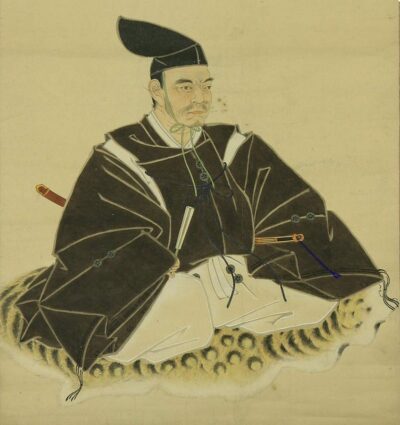
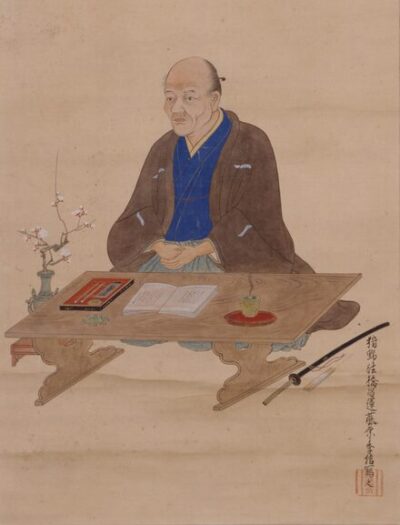
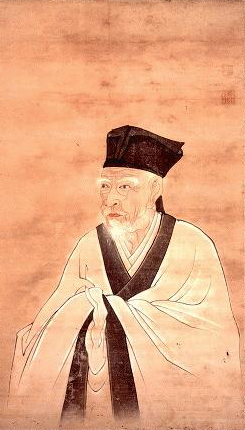
Warning: Undefined variable $comment_form_sns_tags in /home/ktsky/philosophy-kayak.com/public_html/wp-content/themes/shaper/comments.php on line 27
1件のコメントがあります